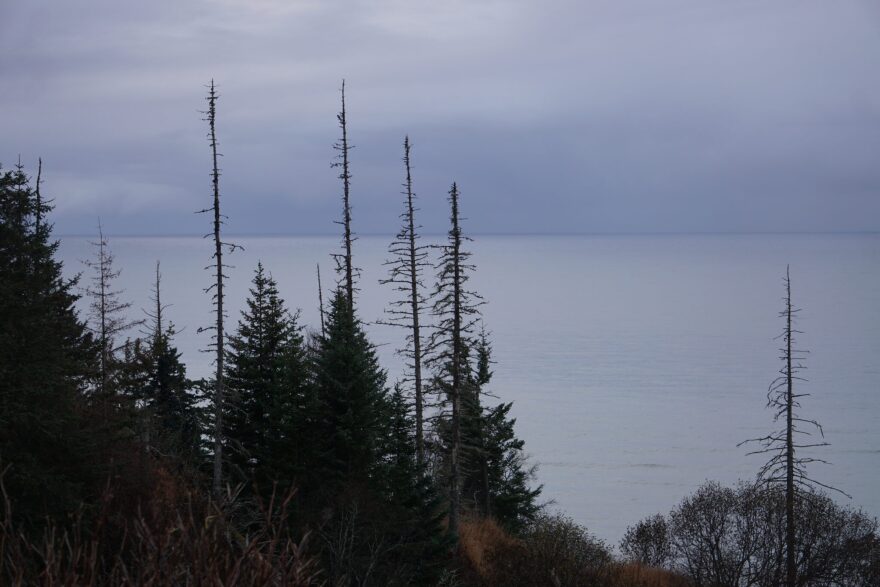The Trump administration on Monday outlined its plans to auction 1 million acres of federal offshore territory in what it has called the “Big Beautiful Cook Inlet Oil and Gas Lease Sale.”
The lease sale, to be held early next year under terms detailed in a notice published Monday in the Federal Register, is to be the first of at least six mandated for Cook Inlet through 2032 under the sweeping budget bill that Congress passed this summer. The bill also mandated 30 lease sales through 2040 in federal waters of the Gulf of Mexico.
“President Trump’s signing of the One Big Beautiful Bill Act marked the beginning of a new chapter for oil and gas development in the Gulf of America and Alaska’s Cook Inlet,” Matt Giacona, acting director of the Bureau of Ocean Energy Management, said in a news release issued Friday. “BOEM is now moving forward with a predictable, congressionally mandated leasing schedule that will support offshore oil and gas development for decades to come.”
In the statement, the agency, which is the Department of the Interior division that oversees offshore oil and gas drilling in federal waters, touted the 12.5% royalty offered in the lease sale as an incentive to bidders. The agency statement noted that 12.5% is the lowest royalty rate allowed for offshore oil and gas production in federal territory.
Lease sale bids are to be opened on March 4.
Cook Inlet lease sales held in recent years, whether in federal or state territory, have drawn little industry interest. That is despite the use of some incentives, such as royalty-free terms.
There are only eight active leases in federal waters of Cook Inlet, all held by Hilcorp, the inlet’s dominant operator. One of those leases was acquired in a sale held at the end of 2022 under a requirement inserted into the Inflation Reduction Act; Hilcorp’s bid was the only one in that lease sale.
Hilcorp also was the sole bidder in a 2017 federal Cook Inlet lease sale, when it acquired 14 leases. Last year, it relinquished seven of those leases.
There is no pending exploration plan for Hilcorp’s eight federal Cook Inlet leases, according to the BOEM website.
Muted industry interest in past sales
Annual areawide Cook Inlet lease sales held by the Alaska Division of Oil and Gas, for both offshore and onshore state territory, have also produced few bids in recent years.

The 2025 state sale drew five bids, according to results released by the division in June. The 2024 sale drew three bids. The 2023 state sale drew six bids. Each sale offered more than 700 tracts spread over about 3 million acres, and in two of those lease sales, Hilcorp was the sole bidder.
For the upcoming federal lease Cook Inlet lease sale, rules used in the 2017 federal sale will apply, BOEM said.
The agency’s Federal Register notice kicked off a 60-day comment period — but only for Alaska’s governor and for local governments. It is unclear whether tribal governments or any other organizations are included among those invited to comment; a question posed to the Department of the Interior press office was not answered by Monday afternoon.
An automatic emailed message from BOEM spokesperson Jennifer Russo said she could not respond to questions on Monday because of the federal government shutdown.
One environmental group that opposes the lease sale plans to submit public comments nonetheless.
“They’re not asking for comments from the public. But we are still planning to make sure that the people who live in Cook Inlet and Alaska and around the country, their voices will be heard,” said Cooper Freeman, Alaska director of the Center for Biological Diversity.
There appears to be no prohibition on public comments, Freeman noted.
Even though recent Cook Inlet lease sales have drawn little industry interest, he said the center has worries about future leasing.
“We hope that there’s no bids, but we’re taking it very seriously,” he said. “All it takes is one drill rig, one pipeline to burst, and it would be over for the inlet.”
The upcoming Cook Inlet lease sale process is separate from a court-mandated review of the 2022 lease sale.
A lawsuit filed by the Center for Biological Diversity and other organizations resulted in a federal court ruling last year that found the presale analysis to be flawed. U.S. District Court Judge Sharon Gleason ordered BOEM to conduct further analysis of leasing impacts to endangered Cook Inlet beluga whales and other natural resources.
BOEM, in a Federal Register notice published in September, said it plans to complete the supplemental impact statement by the end of the year.
The agency said that it will not release the draft study for public comment and will hold no public hearings on the draft, a departure from procedures followed in past environmental studies.
The lack of public comment opportunities or planned public hearings has angered some Cook Inlet area organizations.
Cook Inletkeeper, an environmental group, has launched a petition drive calling for the normal public process to be reinstated.

